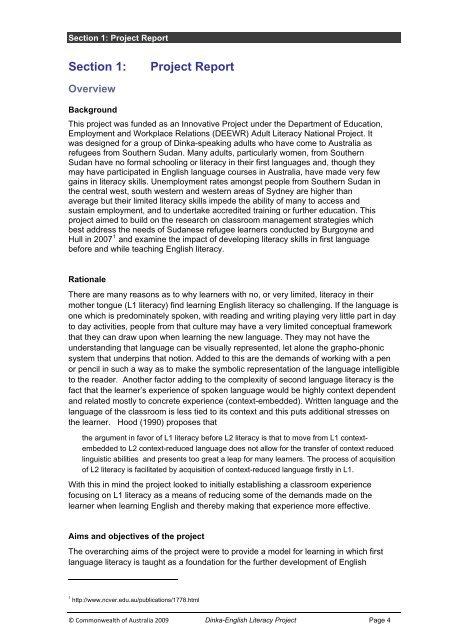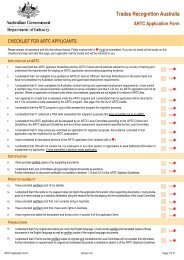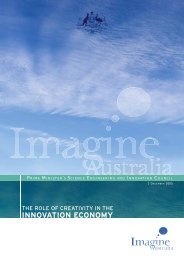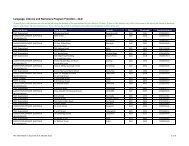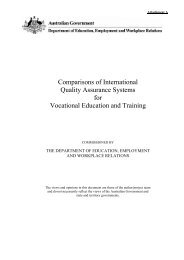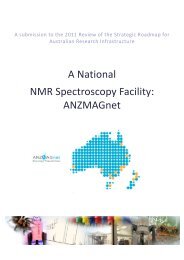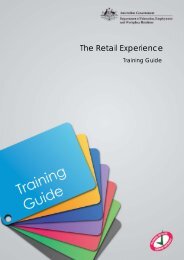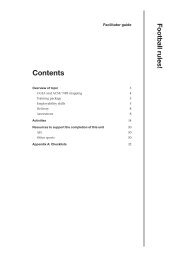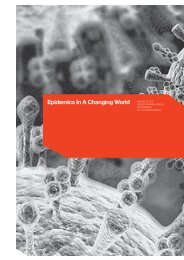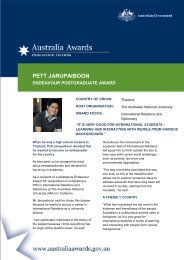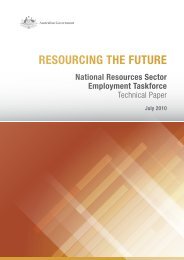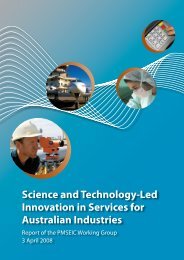First Language (Dinka) Literacy as a Foundation for English ...
First Language (Dinka) Literacy as a Foundation for English ...
First Language (Dinka) Literacy as a Foundation for English ...
Create successful ePaper yourself
Turn your PDF publications into a flip-book with our unique Google optimized e-Paper software.
Section 1: Project Report<br />
Section 1:<br />
Project Report<br />
Overview<br />
Background<br />
This project w<strong>as</strong> funded <strong>as</strong> an Innovative Project under the Department of Education,<br />
Employment and Workplace Relations (DEEWR) Adult <strong>Literacy</strong> National Project. It<br />
w<strong>as</strong> designed <strong>for</strong> a group of <strong>Dinka</strong>-speaking adults who have come to Australia <strong>as</strong><br />
refugees from Southern Sudan. Many adults, particularly women, from Southern<br />
Sudan have no <strong>for</strong>mal schooling or literacy in their first languages and, though they<br />
may have participated in <strong>English</strong> language courses in Australia, have made very few<br />
gains in literacy skills. Unemployment rates amongst people from Southern Sudan in<br />
the central west, south western and western are<strong>as</strong> of Sydney are higher than<br />
average but their limited literacy skills impede the ability of many to access and<br />
sustain employment, and to undertake accredited training or further education. This<br />
project aimed to build on the research on cl<strong>as</strong>sroom management strategies which<br />
best address the needs of Sudanese refugee learners conducted by Burgoyne and<br />
Hull in 2007 1 and examine the impact of developing literacy skills in first language<br />
be<strong>for</strong>e and while teaching <strong>English</strong> literacy.<br />
Rationale<br />
There are many re<strong>as</strong>ons <strong>as</strong> to why learners with no, or very limited, literacy in their<br />
mother tongue (L1 literacy) find learning <strong>English</strong> literacy so challenging. If the language is<br />
one which is predominately spoken, with reading and writing playing very little part in day<br />
to day activities, people from that culture may have a very limited conceptual framework<br />
that they can draw upon when learning the new language. They may not have the<br />
understanding that language can be visually represented, let alone the grapho-phonic<br />
system that underpins that notion. Added to this are the demands of working with a pen<br />
or pencil in such a way <strong>as</strong> to make the symbolic representation of the language intelligible<br />
to the reader. Another factor adding to the complexity of second language literacy is the<br />
fact that the learner’s experience of spoken language would be highly context dependent<br />
and related mostly to concrete experience (context-embedded). Written language and the<br />
language of the cl<strong>as</strong>sroom is less tied to its context and this puts additional stresses on<br />
the learner. Hood (1990) proposes that<br />
the argument in favor of L1 literacy be<strong>for</strong>e L2 literacy is that to move from L1 contextembedded<br />
to L2 context-reduced language does not allow <strong>for</strong> the transfer of context reduced<br />
linguistic abilities and presents too great a leap <strong>for</strong> many learners. The process of acquisition<br />
of L2 literacy is facilitated by acquisition of context-reduced language firstly in L1.<br />
With this in mind the project looked to initially establishing a cl<strong>as</strong>sroom experience<br />
focusing on L1 literacy <strong>as</strong> a means of reducing some of the demands made on the<br />
learner when learning <strong>English</strong> and thereby making that experience more effective.<br />
Aims and objectives of the project<br />
The overarching aims of the project were to provide a model <strong>for</strong> learning in which first<br />
language literacy is taught <strong>as</strong> a foundation <strong>for</strong> the further development of <strong>English</strong><br />
1<br />
http://www.ncver.edu.au/publications/1778.html<br />
© Commonwealth of Australia 2009 <strong>Dinka</strong>-<strong>English</strong> <strong>Literacy</strong> Project Page 4


